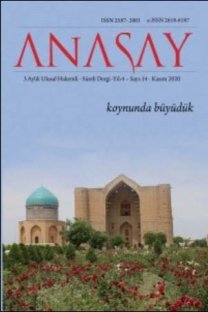HAYATIN HAKKINI GÖZETMEK: GİORGİO AGAMBEN’İN SİYASET FELSEFESİ
Giorgio Agamben, Hayat, Siyaset, Egemenlik, Modernite
Upholding the Right to Life: The Political Philosophy of Giorgio Agamben
Giorgio Agamben, Life, Politics, Sovereignty, Modernity,
___
- Agamben, G. (1999). Means Without Ends: Notes on Politics. (G. Albert, Çev.) Stanford, CA: Stanford University Press.
- Agamben, G. (2001a). Kutsal İnsan: Egemen İktidar ve Çıplak Hayat. (İ. Türkmen, Çev.) İstanbul: Ayrıntı Yayınevi. Agamben, G. (2001b). The Coming Community. (M. Hardt, Çev.) Minneapolis: University of Minnesota.
- Agamben, G. (2005). Yaşam biçimi. (S. Özer ve S. Göbelez, Çev.) İtalya’da Radikal Düşünce ve Kurucu Politika içinde İstanbul: Otonom Yayıncılık.
- Agamben, G. (2006). Language and Death: The Place of Negativity, (K. E. Pinkus ve M. Hardt, Çev.) Minneapolis, Oxford: University of Minnesota Press.
- Agamben, G. (2007). The Work of man. (M. Calarco ve S. DeCaroli, Der.) Sovereignity and Life içinde. California, Stanford: Stanford University Press. California, Stanford: Stanford University Press.
- Agamben, G. (2009). Açıklık: İnsan ve Hayvan, (M. Çilingiroğlu, Çev.) İstanbul: Yapı Kredi Yayınları.
- Agamben, G. (2010). Olağanüstü hal. A. Çelebi (Der.) (F. B. Aydar, Çev.) Şiddetin Eleştirisi içinde. İstanbul: Metis Yayınları.
- Aristoteles. (2009). Nikomakhos'a Etik. (S. Babür, Çev.) Ankara: Bilgesu Yayınevi.
- Balibar, E. (2008). Egemenliğe önsöz. Biz, Avrupa Halkı: Ulus-aşırı Yurttaşlık Üzerine Düşünceler içinde (K. Tunca, Çev.) İzmir: Aralık Yayınları.
- Button, P. (2007). Agamben and Foucault on Biopower and Biopolitics. (M. Calarco ve S. DeCaroli, Der.) Sovereignity and Life içinde. California, Stanford: Stanford University Press.
- Borislavov, R. Agamben, ontology and constituent power”. Debatte, v. 13, n. 2, August 2005.
- Calarco, M. (2007). Jamming the Antropological Machine. (M. Calarco ve S. DeCaroli, Der.) Sovereignity and Life içinde. California, Stanford: Stanford University Press.
- Clemens, J. Heron, N. ve Murray, A. (2008). The Work of Giorgio Agamben: Law, Literature, Life. Edinburg: Edinburg University Press.
- Dubreuil, L. (2006). Leaving politics: Bios, Zoē, life, Diacritics. 36-2, Summer, 2006.
- Durantaye, L. (2009). Giorgio Agamben: A Critical Introduction. Stanford, California: Stanford University Press. Edkins, J. (2007). Whatever politics. Sovereignity and Life içinde (M. Calarco ve S. DeCaroli, Der.) (K. Attel, Çev.) California, Stanford: Stanford University Press.
- Magnuson, R.(2008). Just Barely: Agamben’s reading of bare life from Benjamin’s Critique of Violence. Strategies of Critique. v. 1, n. 1, Spring.
- McLoughlin, D. P. (2009).The politics of caesura: Giorgio Agamben on language and the law”, Law and Critique, v. 20, n. 2.
- Mesnard, P. (2004). The Political Philosophy of Giorgio Agamben: A critical evaluation, Totalitarian Movements and Political Religions. v. 5, n. 1, Summer, ss. 139-157.
- Mills, C. (2008a). The Philosophy of Agamben. Montreal & Kingston: McGill-Queen's University Press.
- Mills, C. (2008b). Playing with law: Agamben and Derrida on Postjuridical justice, South Atlantic Quarterly, v. 107, n. 1, Winter, ss. 15-36.
- Nancy, J. L. İle-Olmak ve demokrasi, (A. Karakış, Çev.) Demokrasinin Doğruluğu içinde, İstanbul: Monokl, 2010, ss. 73-96.
- Norris, A. (2005). Politics, Metaphysics and Death: Essays on Giorgio Agamben’s Homo Sacer. Durham: Duke University Press.
- Pan, D. (2009). Against biopolitics: Walter Benjamin, Carl Schmitt and Giorgio Agamben on political sovereignty and symbolic order. The German Quarterly, v. 82, n. 1, Winter, ss. 42-62.
- Passavant, P. A. (2007).The contradictory state of Giorgio Agamben. Political Theory, v. 15, n. 2, April, ss. 147-174. Schmitt, C. (2002). Siyasal İlahiyat. (E. Zeybekoğlu, Çev.) Ankara: Dost Yayınları.
- ISSN: 2587-2001
- Yayın Aralığı: Yılda 4 Sayı
- Başlangıç: 2017
- Yayıncı: İshak KÜÇÜKYILDIZ
AN IRONIC INTERSECTION OF REALITY AND FICTIONALITY: TLÖN, UQBAR, ORBIS TERTIUS
KUŞTAN AL HABERİ: YAZIŞMADAN YARIŞA POSTA GÜVERCİNLERİ ÜZERİNE BİR İNCELEME
IRAK İLE KUVEYT ARASINDAKİ SINIR MÜNASEBETLERİ
EVLİLİK ÖNCESİ EĞİTİM PROGRAMININ GELİŞTİRİLMESİ VE SONUÇLARININ DEĞERLENDİRİLMESİ (ERZİNCAN ÖRNEĞİ)
YENİÇAĞDA OSMANLI PİYADELERİNİN ASKERİ POTANSİYELİ
İSMET ÖZEL ŞİİRİNDE ‘KAHRAMAN BEN’İN GÖRÜNÜMLERİ
GİYİM MAĞAZASI REKLAMLARININ KÜYEREL DOKUNUŞU: GÖSTERGEBİLİMSEL BİR ANALİZ
Tuğba HARBUTOĞLU, Şule Yüksel ÖZMEN
KÜRESELLEŞEN DÜNYA’DA DAĞ VE İNSAN ETKİLEŞİMİ: RİZE DAĞLARI ÖRNEĞİ
